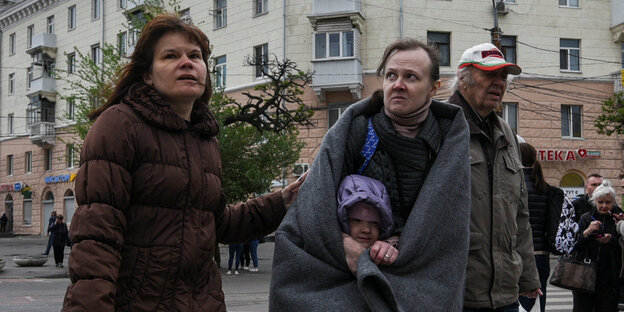The war in Ukraine is at a standstill. Joint military action by the allies, as in the case of the Jewish state, is unlikely.

Residents of Dnipro flee after a residential building was hit by a Russian missile on April 19. Photo: Reuters
SEDAN taz | The morning after Iran's attack on Israel, the Israeli military proudly reported that 99 percent of its drones and missiles had been defended and intercepted. Such a high military success rate has rarely been celebrated. The anti-aircraft defense apparently did a great job, and in collaboration with other states: the United States, France and Jordan helped Israel. Saudi Arabia apparently provided intelligence information. The headlines the next morning were dominated by Iran's attack and Israel's strength. The coalition has made an impression.
Meanwhile, another war was suddenly put aside. In the third year of the Russian invasion of Ukraine, there is no end in sight to the bloody conflict. Even more threatening: the Russian army is gaining more and more ground, apparently planning new fronts in eastern Ukraine and advancing westward. While international solidarity reached an all-time high within days of the start of the war, President Volodymyr Zelenskyi now fears losing support.
The turning point, which was highly praised not only in Germany but around the world, gave Ukraine money and many weapons for months. But the phrase “as long as necessary” coined by US President Joe Biden only seems to apply in part.
This war lasts. Costs. Solidarity is crumbling. Instead, there is debate about whether the conflict between Russia and Ukraine could not be “frozen.” French President Emmanuel Macron's failed attempt not to rule out the deployment of NATO troops or individual national armies to Ukraine (his statements remained very vague) soon disappeared into the political drawer of possibilities.
Why doesn't Ukraine receive the same help?
War fatigue is spreading and with it the silent desire for this problem to end soon in the center of Europe. Reaction in Ukraine ranged from disbelief to despair after Iranian drone attacks on Israeli territory were repelled. Apparently it was and is possible to defend oneself militarily against an aggressor with combined international forces. So why can't this extremely effective air defense be implemented over Ukraine as well? Ukrainian representatives have been repeating exactly this since the beginning of the war.
And so, just hours after the military success of Israel and its allies, Zelenskyi also called for the same protective shield for his country. His Foreign Minister Dmytro Kuleba took the same line and repeated this mantra at political events last week, such as the G7 foreign ministers' meeting on the Italian island of Capri and at the NATO-Ukraine Council.
Western allies moved quickly to discourage a direct comparison between the war in the Middle East and Russia's war of aggression in Ukraine. “A different conflict, a different airspace, a different threat situation,” said John Kirby, spokesman for the US National Security Council. David Cameron, Britain's foreign secretary, warned that the downing of Russian drones by British warplanes would likely lead to a “dangerous escalation.” This last argument is all too familiar to Ukraine. Since the beginning of the invasion, there have been warnings of such an escalation if NATO partners become involved and thus become a “belligerent party.”
But there are more reasons that make Israel's rapprochement with Ukraine impossible. Ukraine directly borders Russia, so there is no “buffer country” in the middle, unlike Iran and Israel. In Iraq, American systems were able to intercept missiles in advance. Furthermore, Israel has effective defense systems. This basic equipment is not available in Ukraine.
Ground equipment and soldiers are needed.

This text comes from Laborable day. Our left-wing weekly! Every week, wochentaz is about the world as it is and as it could be. A left-wing weekly with a voice, attitude and a special vision of the world. New every Saturday on newsstands and of course by subscription.
In addition to targeted airstrikes and drone attacks against infrastructure and energy supplies, Russia has also increased its use of gliding bombs in recent weeks. These are so-called “dumb” bombs, which are equipped with wings and can therefore reach their targets without being detected by radar.
Strategically, air defense systems would have to be used permanently to shoot down fighter jets dropping gliding bombs. In addition to missiles and drones, urban warfare plays an important role in the war between Ukraine and Russia. To take advantage, you need ground equipment and soldiers.
Therefore, Ukraine remains hopeful for a joint military initiative of the allies.
